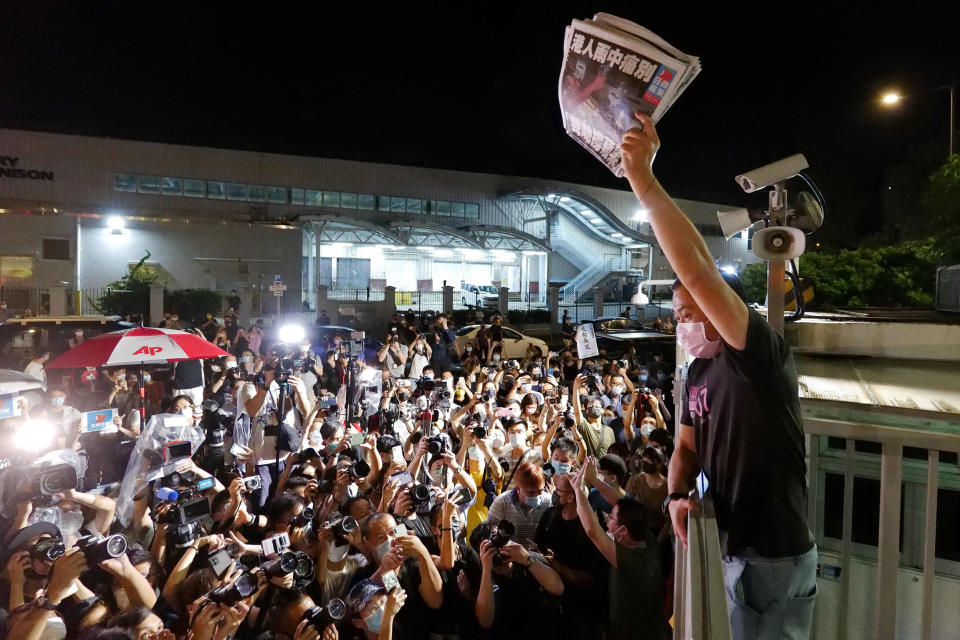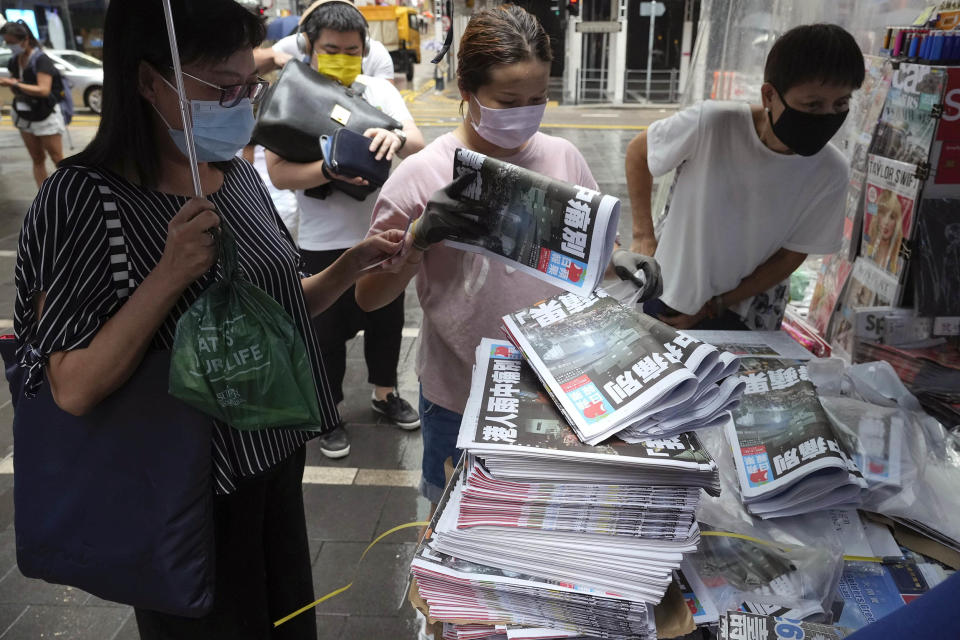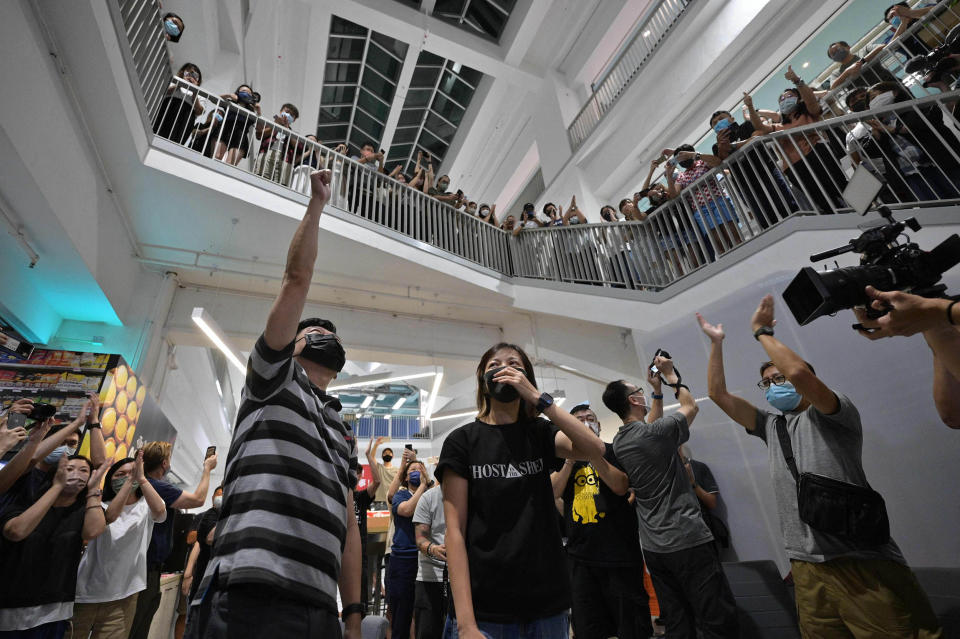Hong Kong says 'painful farewell' to its last pro-democracy newspaper
HONG KONG — The end for Hong Kong’s last pro-democracy newspaper came slowly, then all at once.
The Apple Daily published its last edition Thursday, after a year of ever-deepening restrictions imposed by Beijing and a week in which police raided its offices, arrested senior editors, and froze its financial accounts.
Thousands of people joined lines across the city Thursday morning to get a final copy of the tabloid, a boisterous bastion of the pro-democracy movement throughout its 26-year life and a symbol of its waning hopes in an abrupt death at the hands of a sweeping national security law.
Hong Kongers braved torrential rain to bid an emotional farewell to a paper that had long been a thorn in Beijing’s side, with its final edition of 1 million copies sold out at newsstands across the city.
Its closure was the latest setback for the city’s freedom, and fresh cause for unease about the future of free speech in the global financial and media hub as Beijing cracks down on dissent.

Apple Daily was a go-to source of entertainment, celebrity gossip and news for many Hong Kongers through decades of the city’s change from British colony to semi-autonomous Chinese territory. While its tabloid style drew some criticism, the publication’s political investigations and analysis — with a distinctly anti-Beijing stance — won it praise and support.
As many waited in line just after midnight Thursday, some fought back tears.
A 27-year-old lawyer who requested anonymity out of fear of retribution told NBC News that Apple Daily was a “staple newspaper” in her household growing up.
“But at some point, buying an Apple Daily became more than just picking up your daily paper,” she said, as she stood in line until 4 a.m. on Argyle Street in Hong Kong’s bustling center. “It became a way to participate in a broader movement and show support for a bigger ideal.”
“To know that Apple Daily is being forced to close is a sign that maybe these ideals are being corroded in our city,” she added.

While pro-democracy media outlets still exist online, it was the only print newspaper of its kind left in the city.
But as Beijing tightened its grip after massive monthslong protests in 2019, it settled on Apple Daily as a target.
The paper’s founder, Jimmy Lai, was arrested last year and charged with national security offences. While in detention, he was given a 20-month sentence for taking part in illegal assemblies.
Several reporters resigned after Lai’s arrest, fearing for their safety. Those that chose to remain were well aware of the risk.
“We have mentally prepared that we may be arrested, but we still want to stay and do our job. We want to continue reporting and tell the public what is happening,” Chan, a senior reporter at Apple Daily who requested her first name be withheld for her safety, said in an interview this week.
“We are not scared, but we feel deep grief and indignation."
Related:
Police raided the paper once last year, and did so again last week. They said they had evidence that articles it had published played a "crucial part" in a conspiracy with foreign countries to impose sanctions against China and Hong Kong.
The city’s embattled leader, Carrie Lam, defended the arrests and the raid at a news conference Tuesday.
“What we are dealing with is neither a news outlet problem nor a news reporting problem. It’s a suspicious act of endangering national security,” she said. “So our action is not attacking press freedom.”
The Chinese foreign ministry said that “all rights and freedom, including media freedom, cannot go beyond the bottom line of national security."
And the Communist Party-backed Global Times said in an editorial Thursday that press freedom would remain in Hong Kong, pushing back against criticism from officials in Europe and U.S. lawmakers over the Apple Daily’s fate.
But activists and experts argue that the silencing of the paper represents a severe blow to press freedom in a territory once vaunted as a haven from the mainland’s restrictions.

“The forced closure of Apple Daily is the blackest day for media freedom in Hong Kong’s recent history," said Yamini Mishra, Amnesty International’s Asia-Pacific regional director.
Benedict Rogers, chairman and co-founder of rights group Hong Kong Watch, said that this will “not be the last” incident of its kind.
“To force the closure of the only remaining mass pro-democracy voice is symbolic,” said Rogers, who was also a regular contributor to the publication. “I fear if things continue on this current trajectory, Hong Kong will become like another mainland city under the Chinese Communist Party rule, which means no press freedom.”
Tsui Lokman, an assistant professor at the Chinese University of Hong Kong’s School of Journalism and Communication, said that watching the events unfold was like “watching a terminal patient die.”
“Apple Daily was not just another news organization. It was the loudest, the most critical news organization out there,” Tsui said.
“This is a critical blow to press freedom, but not the end of it. There are still good people, good organizations, trying to do good journalism. But it's a lot tougher now than before. Everyone will now be careful to not touch any invisible lines because it's not even clear what the lines are.”
At the newsroom in an industrial lot near the city’s waterfront, Chan said that some of her colleagues spent parts of the final few days shredding notes and changing passwords to protect sources.
“I am frustrated, angry and sad,” Chan said. “I sometimes wonder if I should leave Hong Kong, but I don’t want to leave. I have to witness and record history. I have to record how press freedom is disappearing.”
Related:
Glacier Kwong, an Apple Daily columnist based in Hamburg, Germany, said that the paper’s writers and contributors came together to “support one another'' during its final days.
“Everybody is upset because Apple Daily represents the vibrant civil society that once existed in Hong Kong,” Kwong said.
Late Wednesday, supporters gathered outside the publication’s dimly lit office building, their chants echoing in unison as the crowd waved their cellphone lights in the air in a mass show of support for the staff inside.
Chan said that her colleagues had only one agenda: to finish their final edition.
“I know many people will picture us being sad and crying a lot, or that the office is surrounded by ominous sentiments,” she said. “But the truth is, we are OK.”
Late Wednesday a notification from Apple Daily’s mobile app appeared on subscribers’ screens. The paper’s content would no longer be accessible after midnight, it read. Soon, articles, photos and videos collectively disappeared from the outlet’s social media pages. Not long after, their social media accounts were removed entirely.
“Apple Daily would like to thank all of our readers, subscribers, advertisers, and Hongkongers for your loyal support,” the notification read.
“Good luck, and goodbye.”

